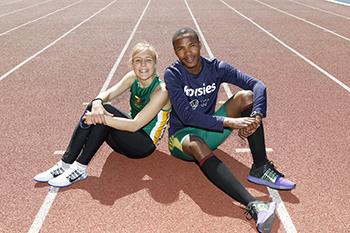Latest News Archive
Please select Category, Year, and then Month to display items
12 October 2020
|
Story Arina Engelbrecht
|
Photo Supplied
 Arina Engelbrecht from Organisational Development and Employee Well-being believes physical activity has a number of benefits for one’s health, including stress relief.
Arina Engelbrecht from Organisational Development and Employee Well-being believes physical activity has a number of benefits for one’s health, including stress relief.
Being physically active plays a big role in preventing the development of mental-health problems and in improving the quality of life of people experiencing mental-health problems.
Treatment for depression
Physical activity can be an alternative treatment for depression. It can be used as a stand-alone treatment or in combination with medication and/or psychological therapy. It promotes all kinds of changes in the brain, including neural growth, reduced inflammation, and new activity patterns are formed that promote feelings of calm and well-being. It releases endorphins – powerful chemicals in the brain that energise your spirit and make you feel good.
Physical activity can be very effective in relieving stress. Research in adults has found that physically active individuals tend to have lower stress levels compared to individuals who are less active. It also leads to improved sleep. When a person sleeps better and feels more rested, overall quality of life improves. They cope better with daily life stressors.
Reduce Alzheimer's risk
Regular physical activity can reduce your risk of developing Alzheimer's disease by up to 50%. It can also slow down further deterioration in those who have already started to develop cognitive problems. It stimulates the brain’s ability to maintain old connections as well as to make new ones.
A study asked people to rate their mood immediately after periods of physical activity (e.g. going for a walk/run, cycling, doing housework) and periods of inactivity (e.g. reading a book or watching television). Researchers found that participants felt more content, more awake, and calmer after being physically active compared to after periods of inactivity.
In conclusion, people who are physically active feel a sense of well-being, feel more energetic throughout the day, sleep better at night, have sharper memories, and feel more relaxed and positive about themselves and their lives.
“Being physically active not only changes your body, it changes your mind,
attitude, and your mood.” – Arina Engelbrecht
Louzanne smashes world record despite strong wind
2017-04-13

Louzanne Coetzee and her guide
Khothatso Mokone.
Photo: Johan Roux
Despite the terribly windy conditions at this year’s Nedbank National Championships for the Physically Disabled, Louzanne Coetzee managed to improve her world record in the 5 000 m race.
Record improved by almost 40 seconds
Last year, Coetzee, who works at the Institute for Reconciliation and Social Justice at the University of the Free State (UFS), was the first blind athlete to complete the 5 000 m race in less than 20 minutes.
Her own record in the 5 000 m race (T11 category) was 19:17.06 and with the help of her guide, Khothatso Mokone, she improved it by almost 40 seconds. The new national record now stands at 18:37.23.
Coetzee says the evening before the race the winds were terrible, and she started to wonder what would happen during her race. “Even though the wind was a bit tough, overall it was a good race,” she says.
Overjoyed by exceptional time
She says that when she heard her time was a new record, she was completely overjoyed and could not believe it. “I was aiming to run just under 19 seconds but when I heard that my time was not only a personal best but also a new world record, I was over the moon.”
The Championships took place from 31 March to 4 April in Port Elizabeth. Coetzee and Mokone will be in action in a Grand Prix in Switzerland next month.